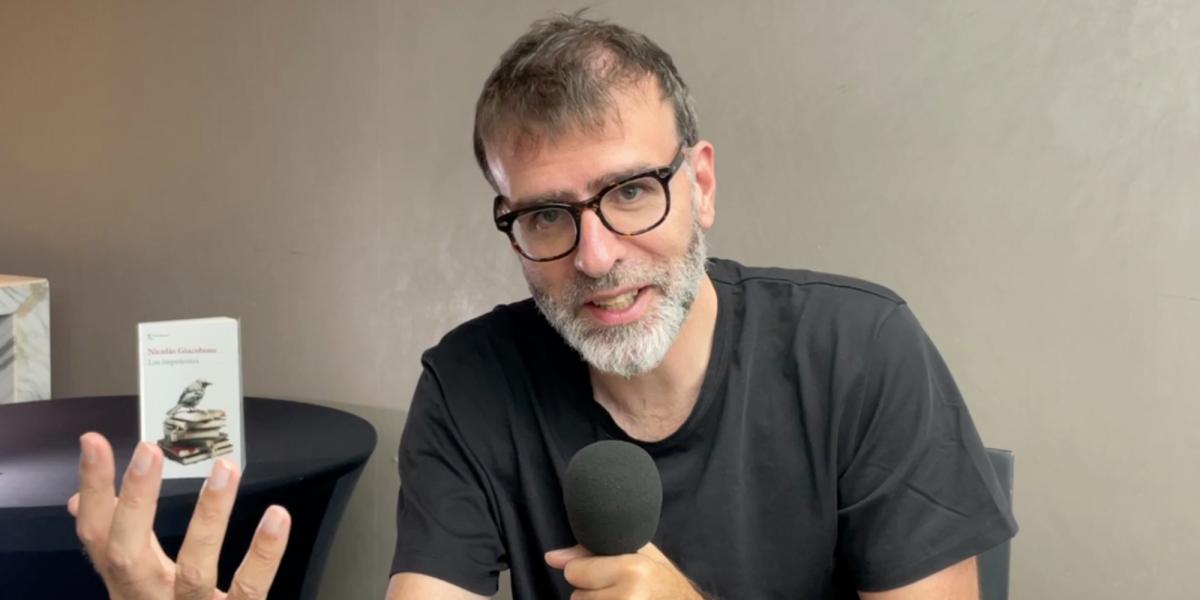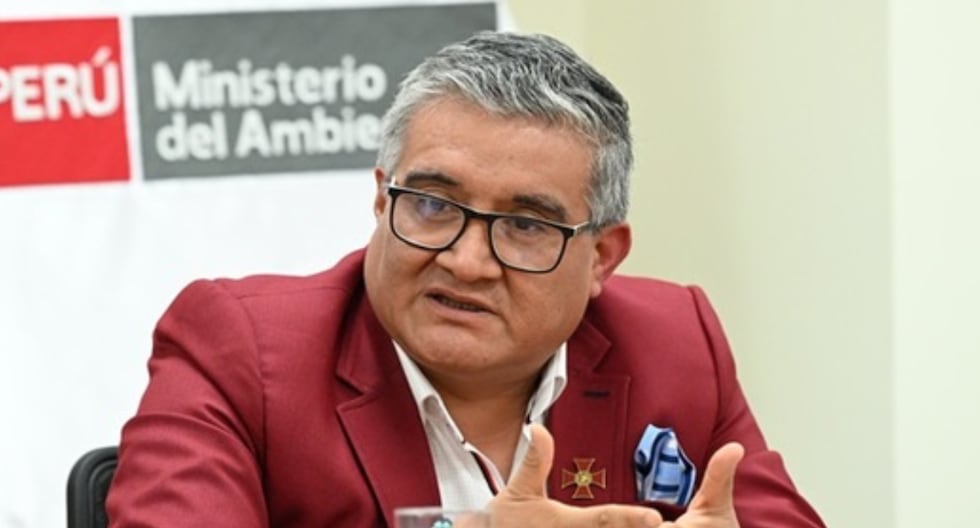“For me it is always strange to talk about works in a very conceptual or thematic way. The ways in which I find the stories I want to tell do not arise from an idea or a concept or a theme but from the simple act of writing, that I love to write and in the very act of putting a sentence behind the another story begins to appear.”
These are the words of the Argentine writer and screenwriter Nicolás Giacobone (Buenos Aires, 1975), best known for his work as screenwriter of the films “Biutiful” (2010), “Birdman” (2014) and “Bardo, false chronicle of a few truths” (2022), by Mexican director Alejandro González Iñárritu, but also a writer to keep an eye on, who is visiting the International Book Fair of Guadalajara (FIL Guadalajara) to present his most recent novel, “Los impotentes”, published by Seix barral.
The universe of “The Impotents” is inhabited by two central characters. One of them is Pan, a man in his late thirties, who is escaping something. Then the character of Emilia appears, his mother and a very prominent writer who, however, maintains a strange, increasingly strange relationship with her son.
This is what the back cover of the book says: “After three decades of sharing the same roof, Pan leaves his mother’s home and decides to reveal the truth to the world. Adopted son of Emilia Mayer, a renowned writer, the young man was actually ‘bought’ and became the victim of an unhealthy relationship with the woman he claimed to be his mother. After the scandal and to try to recover it, Emilia writes her last and best novel under the name of Pan, which will lead her to debacle or, why not, to consecration.”
With a new book under his arm
Giacobone is sitting on one of the tables arranged in one of the executive rooms of The Westin Guadalajara hotel reserved for interviews with the most sought-after writers at the fair.
He explains the very immediate motives of his work: “When I understood that the relationship between Emilia and Pan arose from an act that bordered on crime, perhaps, and how what Pan was escaping from had to do with his relationship with her, I realized that the issue of cancellation could affect the story, there was the big decision, the most complex question when writing the book, whether it was possible to move forward with this conflict, with these characters, without taking sides, without taking strong moral decisions, more than I, Nicolás Giacobone, as a person, had them.”
Issuing a sharp judgment with the characters, taking sides, he points out, “is an act of cancellation in itself, and it closes, that is, it closes the story, and there is nothing more to tell. On the contrary, the biggest challenge is not to fall into that, to go against common sense. Even though the narrator is a third person, every time two characters find themselves in a situation with a particular conflict, I think the job is to be in the shoes of both characters. The most important thing is not to lose empathy.”
–In a story, can pleasing the reader be a bad idea?
“You have to worry about the reader, but the story has to move forward, it has to have rhythm, each scene has to have a value, you know why it is there, but at the same time you don’t have to be afraid of layers.” narratives that go deep, not fully resolve them. It seems to me that a writer is not going to know exactly all the motives of his characters or the layers of his own story. In any case, the moral judgment that a writer makes when writing is the realization that morality itself is made of weak laws that one himself questions.”
Write literature and write cinema
Giacobone’s work as a writer on “Birdman” earned him the 2014 Oscar for Best Original Screenplay. He is a proven author for both books and scripts. What differences does a professional of your nature recognize?
“They are opposite works for two reasons. That is, the act is the same, that of putting one word after another. And the act of writing happens in privacy. It’s not that you write with the director and producers at your side giving their opinion. But cinema, since it is a collaborative act, arises from human, creative agreements, from a lot of talk, from planning; It is like a creative agreement where you come to understand what you want to tell in as much detail as possible before writing the first word. And literature seems to me to be the opposite act, that is, I believe that the very act of writing is the starting point of the entire story and nothing else is known,” he responds and continues:
“Film taught me the responsibilities of the professional writer. Literature is a very cheap art, and it is fascinating for that reason. You only need a pen (brand of an Argentine pen) and a piece of paper, or a computer, whatever. But working in film taught me the responsibility of telling a story, of being effective. In addition to being free, being an artist, being creative and being experimental; You also have to be effective, that is, be as precise as possible, writing the least amount of unnecessary sentences. That is a trade that is learned. It took me a long time to learn it.”
The ideal, he says, “is that the context in which the character develops is extreme and can be as creative as you want, as strange as you want, but that the personal conflicts are universal,” shares the writer and gives their relationship as an example. work with Iñárritu.
“In the case of ‘Birdman’, for example, it started with Alejandro wanting to tell a comedy in a long shot and with the image of a man in his underwear levitating. It was like theater, and at first it was about the strangeness of theater. But the project did not come together until we understood that the story was more of a human dilemma, that it was the story of a father who had asked for his family’s respect. They are very simple things on which the story must lie, far beyond all the madness that can be created around it.”
–What does Nicolás Giacobone spend his free time doing? What cinema do you watch?
—“I am a member of the (Hollywood) Academy, but whenever I have to vote, I wait until the end of the year (close to the awards) and in a matter of three months I see about 50 movies. During the rest of the year what I do most is read. Literature is what feeds me the most and I am very obsessive: I like to find an author and read it chronologically several times,” he responds.
–Who are your favorite authors?
—For the same reasons described above, given that Giacobone usually clings to the chronological reading of some author, and the surnames will always vary depending on the stage of his life, he explains that there are several authors who have accompanied him in valuable stages of his life. .
“The first of them was Samuel Beckett, because it took me away from the conventional reading that I had been into since I was young, from best sellers. It was a blow, he became a kind of second father. Well, but also (Jorge Luis) Borges, obviously, and now more so, at this age, Don DeLillo: his books are conceptual, but the quality of the sentence is impeccable. Also Flanney O’Connor, who was a believer but wrote to question everything she believed.”
–How has it been working with Iñárritu? How familiar are you with the Mexican industry?
—“I am not an obsessive film viewer who has knowledge of current cinema in the world. I also don’t have much time because I’m always working on something and I have my routine, which is very specific. I am the one who chooses those moments of watching movies, which is actually not so good because I wait for the world to tell me which are the 50 movies that are supposedly worth it and I watch them. Although it is clear that they are not the definitive 50 films. That is my sin in the world of cinema, you could say,” says Giacobone at the beginning.
Regarding his relationship with Mexican culture, he complements, since it is a section due to its vastness: “I have come here many times. Bardo is a very Mexican film. Then I did ‘Fiesta en la burrow’, with Juan Pablo Villalobos and Manolo Caro. I love this country, I love coming. I feel very close. Sometimes I feel like they love me more than in Argentina (laughs).”
And, finally, about his relationship with Iñárritu he says: “with him it was an unusual situation because he had the courage to choose an inexperienced scriptwriter to work on ‘Biutiful’, although that does not happen in the film industry, that a director At that level, coming from ‘Babel’, with 15 nominations, choose a writer with no experience. I will always be grateful for that, but we also became friends and the collaboration works. Yes, there is a certain comfort in the job, because it doesn’t feel like work. Furthermore, Alejandro also has that: in each film he is something new.”
And this level of complicity is still fruitful. Giacobone and Iñárritu are working on a film that will surely star Tom Cruise.
*** ***
(VAP DATA)
“I don’t think there is a single writer, who can be considered as such, who has everything clear, that is, who really knows the value of all the elements of life. On the contrary, I think they have more doubts than certainties”
Nicolás Giacobone, writer and screenwriter
*** ***
Nicolas Giacobone
Filmography:
- Party at the Burrow (2024), dir. Manolo Caro
- Bardo, false chronicle of a few truths (2022), dir. Alejandro González Iñárritu
- “Hail” (2022), dir. Marcos Carnevale
- “John and the Hole” (2021), dir. Pascual Sisto
- “Animal” (2018), dir. Armando Bo
- “Birdman” (2014), dir. Alejandro González Iñárritu
- “The Last Elvis” (2012), dir. Armando Bo
- “Biutiful” (2010), dir. Alejandro González Iñárritu
*** ***
His published books
- “Boom boom boom” (2022)
- “The crossed out notebook” (2018)
- “The Powerless” (2024)
*** ***
This has been said of the work
“An insidiously seductive novel about the irresolvable conflict between life and fiction, and art and morality. Nicolás Giacobone’s characters are all victims and perpetrators at the same time, trapped in the immense loneliness of a game-world turned into a board where each step seems to carry a tradition.”
Said by Hanna Nordenhök and Herman Eriksson, from the Swedish Academy.















